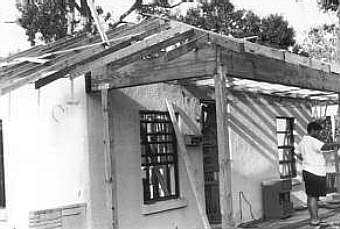| By Michael Wacht WINTER GARDEN — Standing in the
living room of a house hit by a tornado last February, Cheri Cowell looks up at the sky
through a half-finished roof.
As director of Operation L.O.V.E. (Linking Our Volunteer Efforts) in Winter Garden, Cowell
says there is money and materials to finish the job, but she is having trouble finding
volunteers that can do the work on this house and many others. And that’s bringing
the recovery effort in the Winter Garden area to a near standstill.
“If one of the pieces of the puzzle is not there, the whole process stops,” she
says. “The worst part is trying to schedule volunteers to get the job done.”
Operation L.O.V.E. is a disaster relief group operating out of First United Methodist
Church, Winter Garden, that’s assisting Winter Garden’s victims of tornadoes
that swept through Central Florida last February, killing more than 40 people and causing
millions of dollars in damage.
It’s funded primarily by the Florida Conference and the Orlando District. The Winter
Garden church supplies the facilities and pays the operating expenses, Cowell said.
Construction on the area’s damaged homes began last May.
When a family asks the group for help, a volunteer caseworker gathers information about
the family’s situation, then contacts local relief and social service agencies to
request assistance for the family.
When those options are exhausted, the caseworker turns to Operation L.O.V.E.’s unmet
needs committee. Once the committee agrees to help, it looks for money to purchase
materials and volunteers to do the work.
“We have 32 house projects. Only six are completed. Seven are total rebuilds,”
she said. “Twenty-five people are still living in houses with leaking roofs, sagging
ceilings and mildewed walls.”
Cowell said Operation L.O.V.E. has already received $95,000 of the estimated $450,000
needed to meet the requests for help — enough to completely fund seven of the
projects. She said she doesn’t have enough work teams to complete those projects,
however.
“We can’t stop,” Cowell said. “By next August we want to have all of
the jobs completed. Every week that we don’t have volunteers or funding for a job
puts us that much more behind.”
One project in progress is the repair of Ann Seffens’ home. The tornado damaged the
roof and windows, and rain left “two inches of water sitting inside,” Seffens
said. The water caused black mold to grow in the carpet and interior walls.
Although Seffens owns her house, it was not insured because she is paying for health
insurance for her grandson, who needs a new kidney. Now, they can’t afford the
necessary repairs.
A friend gave Seffens a flier from Operation L.O.V.E., and she immediately visited the
group’s office. “When I walked out, I felt better than I had since the
tornado,” she said. “She [Cowell] made me feel like everything was going to be
all right.”
Since then, volunteers have gutted the house, stripped the old roof and added new tresses.
Now, there aren’t any volunteers to finish the job, Cowell said, adding that she has
air-conditioning and electrical contractors ready to begin work. They can’t start
until the new roof is in place.
Despite the stress of the situation, Seffens said she feels the hand of God is with her
family. Youth from Anona United Methodist Church in Largo witnessed to neighbors while
working on the Seffens’ house. “These kids that come over here and work just
bless me so much,” she said. “They sing and really lift me up.
“Y’all are living out what the Bible says. The church should take care of people
— not the government and not the state.” |
![]()
![]()
![]()
![]()
![]()
![]()
![]() Florida Southern College
Florida Southern College![]()
![]() Bethune Cookman College
Bethune Cookman College![]()
![]() FL
UM Childrens Home
FL
UM Childrens Home![]()

